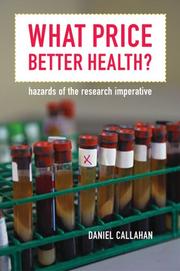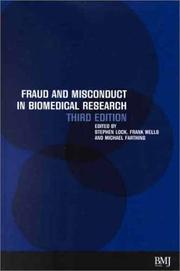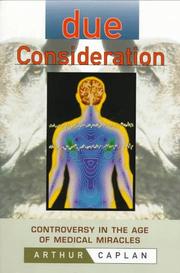| Listing 1 - 10 of 53 | << page >> |
Sort by
|
Multi
ISBN: 9782931051382 Year: 2020 Publisher: Liège : CIRIEC [Centre international de recherches et d'information sur l'économie publique sociale et coopérative],
Abstract | Keywords | Export | Availability | Bookmark
 Loading...
Loading...Choose an application
- Reference Manager
- EndNote
- RefWorks (Direct export to RefWorks)
Abstract: As of June 30th, 2020, the global outbreak of Severe Acute Respiratory Syndrome (SARS)—associated coronavirus 2 (SARS-CoV-2) has claimed about 500,000 lives, with over 10 million confirmed cases and nearly 3 billion people around the world under some form of lockdown. The COVID-19 pandemic has exposed profound weaknesses in a global health system that in the last decades relied in most countries too heavily on the pro-profit private sector for the discovery, development and distribution of new drugs. Pharmaceutical research is slow, risky, and costly. Governments allocate public funds to health-related research – grants for the most part aimed at supporting research upstream of drug development. Rather, late-stage drug development is largely funded by private pharmaceutical companies, drug corporations and venture capitals, which are incentivized to invest by a system of patent monopolies. To maximize their financial returns, private agents invest almost exclusively on the most marketable and profitable biomedical sectors, where drugs command the highest profits even if sometimes offer marginal therapeutic improvements and have little impact on social welfare. Critically important biomedical research sectors remain thus underfunded, and urgent public health needs are left unmet by the investment plans of the industry. Such was the case of drug development to prevent and fight coronavirus infections – neglected by “Big-Pharma” companies despite the alarming concerns raised by the scientific community for almost 20 years, the predicted economic burden of a pandemic on the public sanitary system, and the undisputable societal benefits represented by the discovery of an affordable cure. This pandemic provides a fundamental lesson — one ignored after the outbreak of SARS in 2003, the epidemic of MERS in 2006, and other past pandemics — a lesson about infectious threats that we face globally and that exacerbate vulnerabilities associated with income inequality and health disparities. It is now imperative to rethink the present public health funding strategy, and the roles and goals of all players involved. Here, after a brief analysis of the causes underlying the failure of the private sector to prevent and address the present COVID-19 pandemic, we propose a structural intervention aimed at creating the conditions for a new model of public health research. We detail a plan for an international, interconnected, transparent, science-informed, and publicly funded research infrastructure for pharmaceutical and biomedical research – BIOMED EUROPA. The proposed platform aims at identifying research priorities in the public health sector, focusing efforts on the development of preventive and therapeutic strategies against those diseases that pose the greatest threats to human and social welfare. We suggest that BIOMED EUROPA should be managed as both a research infrastructure, along the model of CERN (the European Organization for Nuclear Research, Geneva) or the EMBL (European Molecular Biology Laboratory, Heidelberg) and as a knowledge-intensive public enterprise with an industrial policy mission, such as the ESA (European Space Agency).
Industrie pharmaceutique. --- Recherche biomédicale. --- Santé publique. --- Covid-19.
Book
ISBN: 9781260455328 1260455327 Year: 2020 Publisher: New York : McGraw-Hill,
Abstract | Keywords | Export | Availability | Bookmark
 Loading...
Loading...Choose an application
- Reference Manager
- EndNote
- RefWorks (Direct export to RefWorks)
"A new, accessible guide to explanations about statistical analytic approaches and methods used in medical research from the experts at JAMA"--
Statistics as Topic. --- Biomedical Research. --- Statistiques comme sujet. --- Recherche biomédicale.
Book
ISBN: 9781284094381 9781284094534 Year: 2017 Publisher: Burlington, MA : Jones & Bartlett Learning,
Abstract | Keywords | Export | Availability | Bookmark
 Loading...
Loading...Choose an application
- Reference Manager
- EndNote
- RefWorks (Direct export to RefWorks)
Biomedical Research --- Research Design. --- Recherche biomédicale --- Recherche --- methods. --- Méthodologie.
Book
ISBN: 9782722604100 Year: 2014 Publisher: Collège de France
Abstract | Keywords | Export | Availability | Bookmark
 Loading...
Loading...Choose an application
- Reference Manager
- EndNote
- RefWorks (Direct export to RefWorks)
Founded by Claude Bernard in xix th century, experimental medicine oriented decisively medical research and especially modern biology. It is thanks to it that the role of the immune system, that is to say the means of defense developed by the organism against microbes, has been highlighted among other things.Located at the crossroads of genetics, immunology and pediatrics, Alain Fischer's work consists in identifying the genetic and molecular bases of rare diseases, hereditary immune deficiencies (IHL), causing infectious vulnerability, autoimmune diseases. ‐Inflammatory, autoimmune and sometimes cancer.
Medicine --- Health & Biological Sciences --- Medical Research --- recherche biomédicale --- système immunitaire --- médecine expérimentale --- immunologie
Book
ISBN: 9781483317588 1483317587 Year: 2020 Publisher: Los Angeles : Sage,
Abstract | Keywords | Export | Availability | Bookmark
 Loading...
Loading...Choose an application
- Reference Manager
- EndNote
- RefWorks (Direct export to RefWorks)
outside back cover : "Conducting Health Research: Principles, Process, and Methods presents an integrated and practical introduction to the principles and strategies for planning, implementing, reporting, and assessing health sciences research. Comprehensive in its breadth and depth, with an accessible writing style, this text prepares students in public health and related fields to be adept researchers and consumers of health research. Through real-world examples and step-by-step guidance, Frederick J. Kviz provides students with the skills they need to: identify and evaluate research strengths and limitations as practitioners; to actually perform the various core aspects of research; and to choose among alternative methods when making decisions about health practice, policy, and future research needs."
Biomedical Research --- Research Design --- methods --- Recherche biomédicale --- Plan de recherche --- Recherche --- methodes --- Méthodologie. --- Biomedical Research - methods --- Research Design. --- methods.

ISBN: 0520227719 Year: 2003 Publisher: Berkeley, Calif. University of California Press
Abstract | Keywords | Export | Availability | Bookmark
 Loading...
Loading...Choose an application
- Reference Manager
- EndNote
- RefWorks (Direct export to RefWorks)
The idea that we have an unlimited moral imperative to pursue medical research is deeply rooted in American society and medicine. This work exposes the ways in which such a seemingly high and humane ideal can be corrupted and distorted into a harmful practice.
Medicine --- biomedisch, medisch-wetenschappelijk onderzoek --- #GBIB:CBMER --- Health Workforce --- Research --- Social aspects --- recherche biomédicale --- Professional ethics. Deontology --- Human medicine


ISBN: 0727915088 Year: 2001 Publisher: London BMJ
Abstract | Keywords | Export | Availability | Bookmark
 Loading...
Loading...Choose an application
- Reference Manager
- EndNote
- RefWorks (Direct export to RefWorks)
It is important to be aware of the legal and ethical frameworks within which research is undertaken and of the steps that are available to prevent fraudulent and dishonest research being undertaken and written up. This book, originally put together by Stephen Lock, an editor of the British Medical Journal, and now revised extensively by Michael Farthing, editor of the gastroenterology journal Gut, provides an overview of the entire topic. Background material on the regulatory frameworks, in North America as well as Europe, is laid out in detail, and the history of fraud and misconduct is illustrated admirably by contributions from Stephen Lock and Frank Wells, a co-editor and expert in ethical and legal issues relating to the pharmaceutical industry. A series of slightly less riveting accounts of individual country’s approaches to research fraud follows, with the best chapters coming towards the end, where personal experiences are used to illuminate the devastating effects that involvement in research fraud can have for patients and practitioners. Michael Farthing has contributed an excellent editorial view on research misconduct to conclude the book.
Medicine --- Physicians --- Médecine --- Médecins --- Research. --- Malpractice. --- Recherche --- Responsabilité professionnelle --- wetenschapsethiek (wetenschappelijk wangedrag, fraude) --- biomedisch, medisch-wetenschappelijk onderzoek --- éthique de la science (inconduite scientifique) --- recherche biomédicale --- Médecine --- Médecins --- Responsabilité professionnelle
Book
ISSN: 2496882X ISBN: 9782759817580 275981758X Year: 2016 Publisher: [France] : EDP Sciences,
Abstract | Keywords | Export | Availability | Bookmark
 Loading...
Loading...Choose an application
- Reference Manager
- EndNote
- RefWorks (Direct export to RefWorks)
L’originalité de l’ouvrage réside dans « L’approche généraliste » qui, sans entrer de manière détaillée sur tel ou tel aspect du sujet, tente de globaliser les connaissances en plaçant la cellule cancéreuse sous le projecteur des diverses disciplines biologiques. Après un rappel des dérèglements génétiques fondamentaux, accompagnant la cancérisation, les rapports entre la cellule maligne et l’organisme sont considérés. L’auteur compare le comportement de la cellule cancéreuse avec celui des cellules saines sollicitées dans l’embryogenèse, la cicatrisation, la régénération, le développement du système immunitaire… Il étudie ensuite le métabolisme altéré des cellules cancéreuses. Enfin, les liens entre inflammation, immunité et cancer sont discutés. Les méthodes préventives et curatives sont ensuite présentées et le problème de la signification biologique du cancer est posé.L’ouvrage présente des qualités novatrices sur le plan des concepts ou des idées. L’approche originale du sujet conduit à envisager des prolongements en biologie fondamentale et en biologie appliquée. Cet ouvrage fait la synthèse des approches médicales et biologiques du sujet.
Tumeurs. --- Recherche biomédicale. --- Cellules cancéreuses. --- Médecine --- Recherche. --- Neoplasms --- Cancer cells --- Research --- Cellules cancéreuses --- Recherche --- pathology --- Biomedical research --- Tumeurs --- Recherche biomédicale. --- Cellules cancéreuses. --- Médecine --- Cellules cancéreuses --- Neoplasms. --- pathology. --- Biomedical Research. --- Biomedical Research

ISBN: 047118344X Year: 1998 Publisher: New York John Wiley & sons
Abstract | Keywords | Export | Availability | Bookmark
 Loading...
Loading...Choose an application
- Reference Manager
- EndNote
- RefWorks (Direct export to RefWorks)
Medical ethics. --- biomedisch, medisch-wetenschappelijk onderzoek --- recherche biomédicale --- Medical ethics --- Biomedical ethics --- Clinical ethics --- Ethics, Medical --- Health care ethics --- Medical care --- Medicine --- Bioethics --- Professional ethics --- Nursing ethics --- Social medicine --- Moral and ethical aspects
Book
ISBN: 9781119701378 1119701384 1119701376 1119701368 Year: 2021 Publisher: Hoboken, NJ : Wiley-Blackwell,
Abstract | Keywords | Export | Availability | Bookmark
 Loading...
Loading...Choose an application
- Reference Manager
- EndNote
- RefWorks (Direct export to RefWorks)
"The aims of this book: I have been teaching research methods to medical, nursing and social sciences students, and in postgraduate medicine, for over forty years. In that time, I have realised that the prospect of learning about doing research, or doing "science", terrifies a lot of people. Many have a "mental block" at the thought of it. "Research is what scientists do and I'm not a scientist!" So, this is where I give my first, and possibly, most important piece of advice: "Don't Panic!" Can you think of the source? These words were written by Douglas Adams in 1979... That's right! They are from his book, The Hitch Hiker's Guide to the Galaxy, and on the back of the Guide are found these immortal words. Remember them. You don't need to panic when you are learning about Research. You can do it"--
Biomedical Research --- Research Design --- Students, Medical --- methods --- Biomedical Research - methods --- Recherche biomédicale --- Plan de recherche. --- Étudiants en médecine. --- méthodes. --- Research Design. --- Students, Medical. --- methods. --- Recherche biomédicale --- Étudiants en médecine. --- méthodes.
| Listing 1 - 10 of 53 | << page >> |
Sort by
|

 Search
Search Feedback
Feedback About UniCat
About UniCat  Help
Help News
News